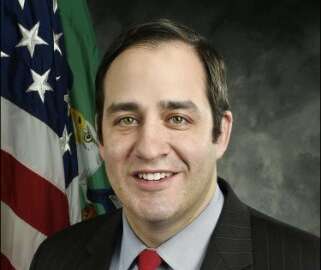
Blockchain gets renewed focus with IT modernization funding in place
There's a lot of buzz about blockchain in government IT offices these days, and there's more to it than serving as than the technology behind Bitcoin.
Best listening experience is on Chrome, Firefox or Safari. Subscribe to Federal Drive’s daily audio interviews on Apple Podcasts or PodcastOne.
Blockchain is generating a lot of buzz in government IT offices these days, and it does more than serve as the technology behind Bitcoin.
Speaking Tuesday at the ACT-IAC Blockchain Forum in Washington, Jose Arrieta, the Department of Health and Human Services’ associate deputy assistant secretary for acquisition, said blockchain has given his agency the flexibility it needs without being hamstrung by legacy IT systems.
“What interests me about blockchain isn’t really what it does, it’s the agility that it gives you, meaning I can layer it over my existing systems and I can use it as a repository to create a data layer, and I can build microservices to add value off the data layer,” Arrieta said. “Blockchain as a technology gives me that flexibility to interact with the old, and leverage the old for what it’s worth, but be really flexible for the new.”
Interagency collaboration needed
Blockchain could play a major role in the Trump administration’s push to modernize government IT. During last month’s budget negotiations, Congress approved a $100 million Technology Modernization Fund (TMF) for governmentwide projects in fiscal 2018, less than half of what the Trump administration requested.
Tony Scott, the former federal chief information officer, said the fund is a step in the right direction and could help accelerate blockchain projects across government. But without interagency collaboration, he warned that blockchain could lead to further stovepiping.
“My fear is that with all the enthusiasm around blockchain, what we’ll get is 10,000 or 20,000 very unique, very siloed, unshareable solutions and while it may make things more efficient in some sort of siloed way, my fear is that it would fail to take advantage of what I think are some of the better properties of blockchain technology,” Scott said.
In order to get the most out of blockchain, Scott said agencies should organize their blockchain efforts around common challenges.
“Let’s go create some common thing that agencies can literally take advantage of right away without having to go do a bunch of individual work in every single agency and all of the discrete customizations that would go along with that,” Scott said. “Getting the federal government to do anything as a whole is really hard, but there’s some great examples of cases where that’s been done. So let’s leverage those learning and those examples and use that a lubricant to the flywheel of getting stuffing going.”
But civilians agencies are not the only ones catching blockchain fever. Agency officials across the Defense Department are also looking at what blockchain can do for them when it comes to logistics, supply chain management and cybersecurity.
A provision in the 2018 National Defense Authorization Act requires DoD to study federal adoption of blockchain, and requires Defense Secretary Jim Mattis to provide Congress with an assessment of what DoD plans to do with blockchain in the future.
“It’s a lot of cultural barriers that need to be broken down to get an agency ready to take on blockchain,” said Sherri Sokol, a member of the Defense Information Systems Agency’s innovation team.
With blockchain, starting small
Meanwhile, the U.S. Digital Service is working across government to help bring agencies up to speed with blockchain technology. Brent Maravilla, an acquisition strategist at USDS, said he recommends agencies start small when they learn to use blockchain, and take on a project that can be completed within a year
“You can race toward making a minimum viable product that you can show and actually does something,” Maravilla said. “After that, in six to nine months, you can make a quick decision. Are you going to continue with this contract and build more functionality, or are you going to recompete this. Is it not a good idea and we try something else?”
The Congressional Blockchain Caucus is also taking note. Hilary Gawrilow, a policy adviser for Rep. Jared Polis (D-Colo.), the caucus co-chairman, said blockchain could, for example, play a big role in helping the Coast Guard move to a working electronic health record system.
The Coast Guard scuttled its last EHR system in 2015, and since then, it has gone back to using pen and paper.
“I think that’s a great opportunity for the Coast Guard because they’ve had to go back and forth, and now they have to start over,” Gawrilow said.
Copyright © 2025 Federal News Network. All rights reserved. This website is not intended for users located within the European Economic Area.
Jory Heckman is a reporter at Federal News Network covering U.S. Postal Service, IRS, big data and technology issues.
Follow @jheckmanWFED




